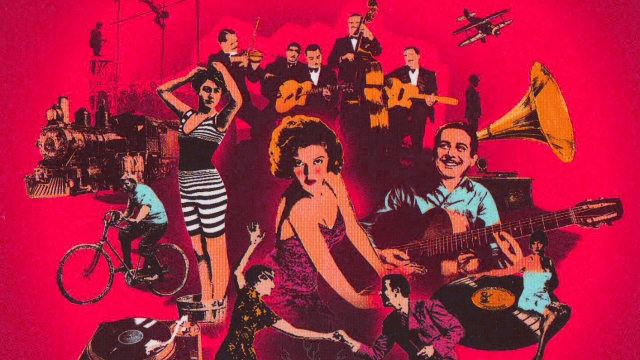
The other side of the Atlantic may already be big on it, but tomorrow's Electro-Swing Show at Sala Rossa is certainly a Montreal first. Playing with bits from 1920's jazz and swing with the most up-to-date of electronic tools, Electro-Swing is at the same time a hip, avant-garde development and a retro turn for the club and house world. This unlikely mix of genres has caught on creatively and popularly with clubgoing Europeans in recent years, so now—of course—it's made its way to Quebec.
With a live jazz band (The Jazz Street Boys), a burlesque act (Miss Sugarpuss), and a handful of local nu-jazz DJs (DJ Eliazar, Don Mescal, Khalil) on the bill, the first Electro-Swing Club Montréal will definitely service those with a broad theatrical and musical palette. And for those of us who need to brush up on our swing, there's also—believe it or not—the offering of free dance lessons by Montréal's own Swing 88 Dance Studio before the music officially kicks off.
Finally, headlining the event is the very eclectic DJ Delay, or UK-bred, now Berlin-based Brian May. Since the start of the summer season, he's been touring throughout Europe armed with a sound colored by a world's worth of influences. May took time out of his touring schedule for a nice, long-distance chat with us about his love for Balkan music, trumpets and, naturally, the BBC Radiophonic Workshop.
You're next touring stop is in Novi Sad, Serbia, from which your music derives a lot of influence. What was your journey to that Eastern European world, musically speaking?
It's a good question and I'm not sure of the exact answer. But it probably started with an appreciation of Indian music actually—in the early 90's. Growing up in England, since it's one of the predominant musical cultures that isn't Western, just by nature of being there I got very much into that music. So I even went to India to study Tabla and all those sorts of things, before actually doing Radio in Australia—where I obviously got to work with a lot of different sounds.
Finally, in 2000, I heard Taraf de Haïdouks for the first time, though I didn't quite make the musical connection until a friend handed me some Hungarian music. When I heard the brass in there—since I've always been a trumpet player myself—it really caught my ear. The modes they play just really interested me. So that's my path to Eastern European music, with a lot of foundations laid over time.
Wow. And how'd you end up taking an electronic spin to those influences?
Right. With that, I've always been fascinated with electronic music since my childhood. In England, there was a lot of electronic music just on television—you know, the BBC Radiophonic Workshop is famous for their weird sounds. And some of the kids programs had music from Kraftwerk in their theme-tunes. So, again, just growing up we got it. When I started making my own music in Australia, playing with electronic sounds just sort of felt natural. I mean, every kid growing up in England has got a healthy dose of weird sounds from cartoons and the Radiophonic Workshop. In a way, it probably explains quite a lot actually.

Would you say that new electronic sounds and tools open the door to the use of older music—such as earlier Balkans sounds, or jazz and swing?
Absolutely. Of course, it's a lot easier to sample 20's and 30's music than it is to play it. The funny thing for me is, when I was nine, I was actually the trumpet player in a Swing, ‘Big Band.' We played Glenn Miller and mostly 40's era Swing. So for Electro-Swing to come on the scene in the last three years or so is very funny for me because—after the 20 years I've been DJing—the music has now come full-circle from what I played first as a kid into the dance and electronic realm.
You're obviously very eclectic. Do you see your music going off in any new regional directions in the near future, or are you satisfied with your explorations for the time being?
As far as countries go, I don't particularly see myself going off in new directions. Though in general, it's really anything that catches my ear that I might incorporate. Still, at the same time, I'm a bit wary of doing the music justice. If you're sampling a culture—not only literally in the tunes, but also getting deeply involved with it—it's better to learn and delve into what's behind the music rather than just cutting up ‘exotic' sounds. You really should put the music into context. And hey—at least I've got that down for Swing.
Yep. So I take it you can swing?
I have to admit I can't. But there are those dance classes at the beginning of the show so I think I'll have to partake.
And have you been to Montréal before? Seems you've been across the globe…
Actually, this will be my very first time in Canada. I'm excited for it.